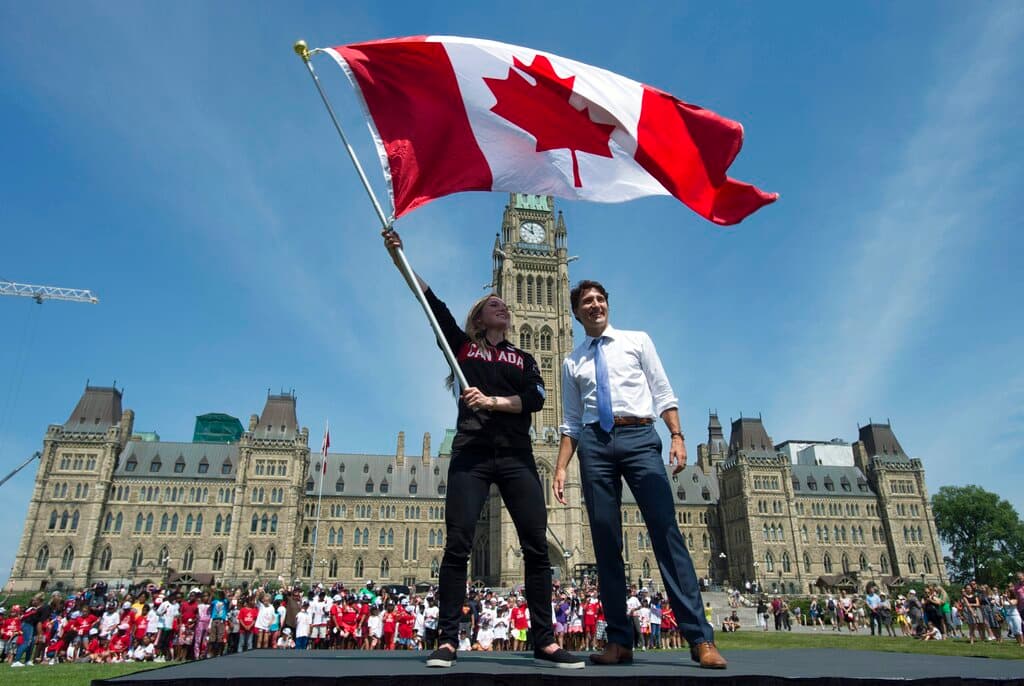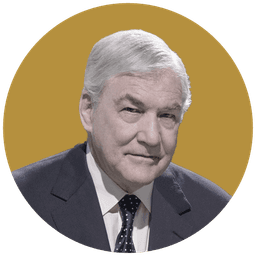Canada Finds Itself Desperate for Leadership, Lest It Go the Way of the Habsburg Empire
Plus, the current regime has gone a bit cock-a-hoop on climate.

This column is being composed as I return to Toronto on an Air Canada flight from Vancouver after a convivial celebration by the Fraser Institute, Canada’s leading public policy think tank. The occasion was the retirement, after 15 years as Fraser’s chairman, of Peter Brown, an outstanding and very public-minded financier, a delightful friend, and one of Canada’s great men.
There appeared to be at least 500 people packing out a large hotel ballroom and the featured attraction was a joint discussion chaired by the Fraser Institute’s president, Niels Veldhuis, in which I was privileged to join a former prime minister, Brian Mulroney, and a former premier of British Columbia, Gordon Campbell. The ostensible subject of discussion was how we all thought Canada was doing.
Readers will recognize the strong electoral credentials of my colleagues: Mr. Campbell won four consecutive municipal elections, three as mayor of Vancouver, and five provincial elections, one as leader of the opposition and the last three emerging as premier.
Mr. Mulroney won all three elections he contested, twice being elected prime minister, the first person to win two consecutive majority election victories to that office since Louis St. Laurent in 1953. I was victorious in my one election, to the British House of Lords, but only because of the miniature though distinguished electorate: the then leader of the opposition (William Hague), then prime minister (Tony Blair), and on their advice, her Majesty the Queen.
The principal points we were asked to address were the state of Canadian federalism, Canada’s economic condition, and Canada’s standing in the world. The Fraser Institute is nonpartisan; Mr. Mulroney was a Progressive Conservative and Mr. Campbell’s B.C. liberals were effectively a Liberal-Conservative coalition. I have supported both major parties at different times. Prime Minister Trudeau was only mentioned once or twice in passing.
The consensus that seemed to emerge and to be supported by the distinguished audience was that Canada had squandered its former status built up by the Chretien and Harper governments as a fiscally strong, budget-balancing, hard-currency country; that public and private debt levels were now dangerously high; and that federalism is in potentially serious crisis.
That is because of the present federal government’s hostility to the oil and gas industry, which constitutes an unjustified economic war on Alberta and Saskatchewan, and because of the government of Quebec’s repression of the language and education rights of English-speaking Quebeckers.
I offered the view, as I have in these pages and elsewhere, that the antics of the present Quebec government look like incremental separatism, the pursuit of sovereign independence on the installment plan. The implications of eliminating any official status for the language of more than 70 percent of Canadians and constricting its education rights in the country’s second-largest province are serious.
No one dissented when I said that the current prime minister’s father, Pierre Trudeau, would have taken draconian measures to challenge the imposition of the current Bill 96, the repression of the country’s principal official language in the workplaces of the federal government and federally chartered corporations of a province of nearly 8.5 million people.
All were agreed that this is a magnificent country with immense resources, a skilled and well-motivated population, a history that is the proud development of half a continent over four centuries, with no serious historical reason for shame — we only participated in just wars, victoriously, seeking nothing for ourselves and motivated only by a desire to support the cause of freedom throughout the world. A number of those attending professed to me privately to be outraged by how little is known or taught of Canadian history.
I am not adequately familiar with the federal budget to be able to propose detailed expense reductions to tackle our imposing federal deficit, but my colleagues, intimately familiar with the challenges of public finance, made a number of knowledgeable suggestions.
All agreed that if all the pipelines that have been proposed south, east, and west were built, personal and corporate income taxes were reduced to more competitive levels, and the regulatory climate were made less forbidding, the $180 billion deficit in capital flows of the last eight years — the amount by which foreign investment in Canada was exceeded by Canadian investment outside Canada — would be reversed and Canada’s steady loss of comparative net worth per capita would also be reversed.
I inflicted on the group my wistful recollection that when I was young, Canada was always referred to, and was, the second-wealthiest country per capita in the world after the United States. We are now barely in the top 20. The United States with all its problems is between 30 percent and 40 percent more prosperous per capita than Canada.
Mr. Mulroney lamented that Canada has lost its place in the world; despite fervent campaigning, it had been defeated in its recent bids for a temporary seat on the United Nations Security Council by Portugal and Ireland.
Mr. Campbell struck a note that clearly brought widespread agreement when he called for “big and ambitious projects.” Of course he is correct: This is precisely what instills pride and captures the public’s imagination. He referred, very appositely, to the Canadian Pacific Railway, one of the engineering and financial marvels of the world when it was built 140 years ago.
It had to go largely over the Canadian shield, unlike the American railways that passed through grasslands all the way to the Rocky Mountains, and the CPR had to be largely financed in London and New York, where there was much competitive hostility to it. No one wanted Canada to succeed except Canadians, and to some extent and for their own reasons, the British.
There have been such projects in living memory, including the St. Lawrence Seaway and the Montreal World’s Fair of 1967, when the eyes of the world were on Canada and the world was impressed. The following 25 years were dominated by the Quebec question and we managed that well, especially Pierre Trudeau and Mr. Mulroney.
There appeared to be a general consensus that the current regime has gone a bit cock-a-hoop on climate. All the speakers, and especially the two who have led large jurisdictions, spoke of the need for leadership to take hard decisions to reduce deficits, and incentivize more swiftly rising prosperity, before we are surpassed by emerging countries such as South Korea and Israel.
It was generally agreed that central bankers should stay out of climate questions and other controversial crises far removed from monetary policies. The current federal conservative leadership race was mentioned but the panelists were guarded. The only person apart from the participants, and just from the mention of his name, who drew substantial applause was Pierre Poilievre.
This was a knowledgeable and worldly audience convened by an outstanding center for public policy analysis; everyone recognized that Canada is a great but underperforming country. There was agreement that immigration was unambiguously desirable and was part of the solution of the problem.
There wasn’t time to get too far into national morale, but in some of the sidebar conversations I found some support for my hopeful suspicion that with all of the problems that have been beleaguering America for some years, Canada’s ancient and often self-conscious preoccupation with the contiguity of that country may be subsiding.
It was said for a century or more that the condition of the late Habsburg Empire in Vienna was “hopeless but not desperate.” Canada is full of justified hope but in desperate need of inspired action. We are waiting for leadership.
From the National Post

